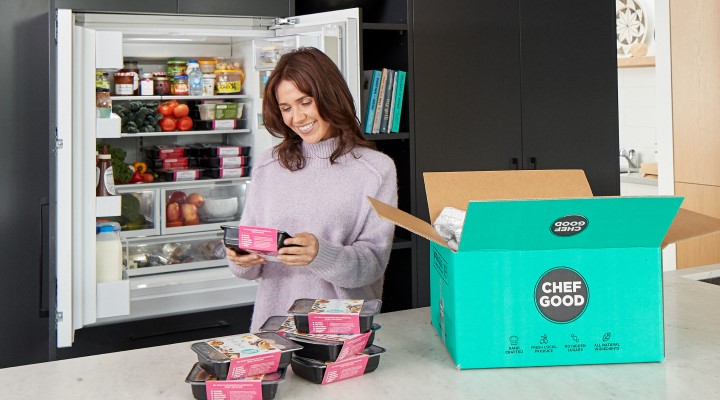The last few years have seen massive changes in the way many Australians eat. Intermittent lockdowns and supply chain issues, as well as more time at home, have caused a spike in the popularity of at-home meal kits as customers seek a healthier alternative to ordering out. According to data from Nielson, the Australian meal kit market is estimated to be worth more than $300 million a year. Global meal-kit provider Marley Spoon has seen strong growth throughout this time, with revenue up approxim
proximately 30 per cent in the last several periods – driven by strong performance in Australia and the United States.
Using this growth, the business has entered into new territory to expand its customer base.
Throughout the pandemic, Marley Spoon launched its own ‘human-grade’ pet food subscription service, Bezzie, opened its six green star distribution centre in Wetherill Park, Sydney, and recently purchased ready-made-meal business Chefgood.
Exploring new frontiers
Chefgood, which offers ready-made meals in vacuum sealed packaging to customers within Melbourne, Sydney, Brisbane, Adelaide and Canberra, was purchased last December for $21 million and gives Marley Spoon access to a new market.
“We’re now serving a different customer segment – those who were not interested in cooking from scratch on a regular basis, may be more time-poor, or may place more importance on weight-loss or health outcomes,” said Marley Spoon Australia chief executive Rolf Weber.
“Adding Chefgood to our portfolio expands our meal solutions, and gives customers more choice.”
Weber said that while some customers have developed a new love of cooking throughout lockdowns, others require an easier and faster option to eat well – this is where Chefgood fits into the business’ offering.
It also gives Marley Spoon a piece of the ready-made meal market, which is expected to be worth $1.6 billion in Australia by 2024 according to research firm GlobalData.
Marley Spoon isn’t the only meal kit provider operating in the space, however, with global giant HelloFresh having bought up Australian-owned YouFoodz last year.
Meals for your best friend
Beyond ready-made meals Marley Spoon is also now focused on our furry friends, and the $2.9 billion pet food market, with the launch of Bezzie.
Utilising Marley Spoon’s e-commerce, marketing and delivery capabilities, Bezzie aims to provide the same level of personalisation and convenience that its meal kit customers expect but with high quality dog food.
And while the business only launched last October, Weber said he’s very pleased with the customer response so far.
“The feedback has been positive in terms of the overall service and most importantly the quality of food,” Weber said.
“It’s a new category for us, so we’ve placed great importance on listening to and learning from our customers to see how we can further improve our offering and grow the Bezzie brand [this year].”
“It’s part of the Marley Spoon family now, which means we’re able to leverage and tap into logistical and operational benefits. Plus, for consumers who have historically gone to buy their furry friend’s food in retail stores, Bezzie provides convenience.”
Bezzie also launched in the US last year, where Marley Spoon has operated since 2015, where it also operates a Martha Stewart & Marley Spoon offshoot of its core business – where Stewart curates the recipes that customers can choose from each week.
A time for growth
It’s been a difficult few months for all businesses relying on fresh food. with supply chains burdened by the Omicron variant’s spread and speed. Marley Spoon, which prides itself on delivering top-grade food to its customers each week, is no exception.
“It’s safe to say that the whole food sector has been affected in some way or another by Covid-19 and the ongoing impact it has on the supply chain,” Weber said.
“We’ve faced many challenges and speed bumps since the pandemic began, amplified by flooding and other weather-related issues, [but] we continue to work with our team and suppliers to adapt, pivot and overcome or minimise the impact of these issues.”
As such, the year ahead is less about making major moves and more about cultivating what the business has, according to Weber.
“It’ll be a big year for us on many fronts,” said Weber.
“It’ll be a year of driving growth across all regions we operate in, constantly looking at how we can innovate in and increase recipe and product choice, as well as improve our customer personalisation offerings.”

